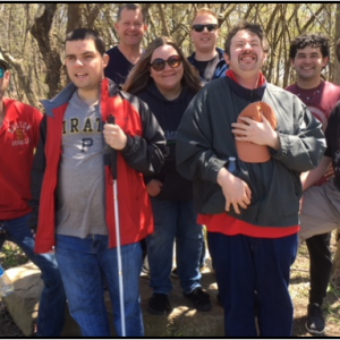Direct Support Professionals teach independent skills and provide assistance with socialization, finances, life skills, and more to individuals with disabilities, helping them achieve greater independence and an improved quality of life. The ideal candidate should have professional technology skills, strong organizational skills, and the ability to establish and maintain effective working relationships with individuals to achieve their goals.
In-Home and Community Support
In-Home and Community Support aids in acquiring, maintaining, and improving the skills necessary to live in the community, to live more independently, and to participate meaningfully in community life. Supports consist of guidance (physical assistance, instruction, prompting, modeling, and positive reinforcement) in the general areas of self-care, healthy living, decision making, home management, managing personal resources, communication, mobility and transportation, relationship development and socialization, participating in community functions and activities and use of community resources based on the goals set by each person to live their everyday life.
- Professional Technology skills
- Good written and oral communication
- Strong organizational skills
- Ability to multi-task and prioritize.
- Ability to establish and Maintain effective working relationships with groups and individuals based on the goals set by each person to live their everyday life.
Community Inclusion
Community Inclusion helps a person to gain the skills needed to live in the community.
This service includes things that will help a person improve his or her activities of daily living (ADLs). ADLs are things usually done at home, such as bathing, dressing, eating, doing housework, managing money, and cooking. This support also includes teaching and improving skills that will help him or her to be active in their community. These are things like socializing, getting to know the neighborhood where he or she lives, or participating in community activities such as hobbies, shopping or attending an event.
- Professional Technology skills
- Good written and oral communication
- Strong organizational skills
- Ability to multi-task and prioritize.
- Ability to establish and Maintain effective working relationships with groups and individuals based on the goals set by each person to live their everyday life.
Community Participation Support
Community Participation Support is intended to assist individuals with community life activities. This service involves participation in activities that involve persons without disabilities who are not caregivers. This will result in the individual developing and sustaining a range of valued social roles and relationships; building resources and experiences in the community; increasing independence; increasing potential for employment; and experiencing meaningful community participation and inclusion.
- Professional Technology skills
- Good written and oral communication
- Strong organizational skills
- Ability to multi-task and prioritize.
- Ability to establish and Maintain effective working relationships with groups and individuals based on the goals set by each person to live their everyday life.
Companion services
Companion services are direct services provided to individuals for providing supervision or assistance that is designed to ensure the participant’s health, safety, and welfare or to perform activities of daily living for the individual. Companions may supervise, assist, or even perform activities for an individual that include grooming, household care, meal preparation and planning to guarantee a daily quality of life.
- Professional Technology skills
- Good written and oral communication
- Strong organizational skills
- Ability to multi-task and prioritize.
- Ability to establish and Maintain effective working relationships with groups and individuals based on the goals set by each person to live their everyday life.
Respite services
Respite services are direct supports that are provided to supervise and support individuals on a short-term basis for planned or emergency situations, giving the person(s) normally providing care a period of relief when, for example, the individual may not want to attend a vacation, or the family member is not able to provide the needed support for the time being due to medical reasons.
- Professional Technology skills
- Good written and oral communication
- Strong organizational skills
- Ability to multi-task and prioritize.
- Ability to establish and Maintain effective working relationships with groups and individuals based on the goals set by each person to live their everyday life.

